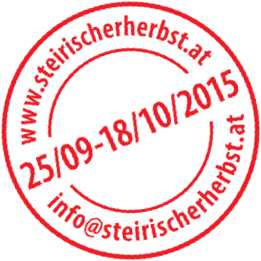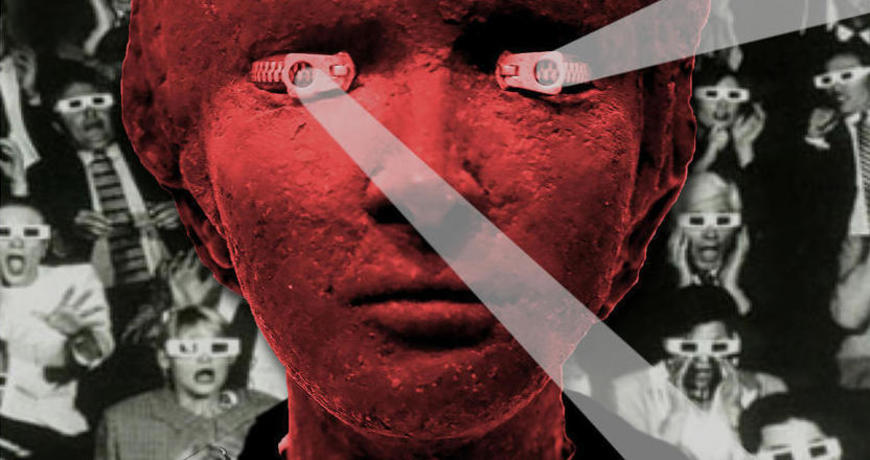

steirischer herbst 2015 opens with an installation-based concert performance. Composer Johannes Maria Staud and poet Josef Winkler venture a contemporary music theatre experiment together with Ensemble Modern.

German language
Talk following the performance on
Sat 26/09
With DJ Kira Kirsch & DJ Norman Palm
The 2015 festival opening is another artistic venture: the composer Johannes Maria Staud meets the writer Josef Winkler. Their joint work, specially developed for steirischer herbst, is a subtle interplay of music and text. Not an
opera, but an installation-based concert performance.
A contemporary music theatre experiment.
“Specter of the Gardenia oder Der Tag wird kommen” – surrealist Marcel Jean’s sculpture inspired Josef Winkler to create an unusual surrealist monologue. Formally, his text consists of three elements: litany-style invocations of an imaginary vis-à-vis alternate with retrospective views of a Catholic childhood in Carinthia and powerful plaints on contemporary society. “You petroleum society, you watchers of our tragedy, with the tattooed model of a gallows in the jumpy hollows of your knees, the plagiarised plastic roses on your threadbare wreaths, you who take the sepulchral smile at its word with the smell of fresh ink mixed with human heart blood – oily hand on heart! – how many axes does your heaven need anyway?”
The Austrian Johannes Maria Staud is one of the most internationally renowned composers of his generation. In close collaboration with the Büchner Prize winner Josef Winkler he developed the composition for twenty-two instrumentalists of Ensemble Modern. The main speaking part of the evening is played by the actor Johannes Silberschneider, who has received several prizes for his numerous film and television roles, winning the Grand Diagonale Acting Award in 2012. The artistic team headed by the young director Sofia Simitzis translates the artistic montage into three dimensions, into a kind of image or world machine. Large format projections on unusual objects, light, images, and the actions of the speaker and the ensemble interweave – engaging all the senses.
Music Johannes Maria Staud
Text Josef Winkler
Speaker Johannes Silberschneider
Conductor Emilio Pomàrico
Direction Sofia Simitzis
Sound direction Norbert Ommer
Set design and costumes Inga Timm
Assistance set design and costumes Franziska Sauer
Video Heta Multanen
Light Voxi Bärenklau
Ensemble Modern
Flute, alto flute, piccolo and slide whistle Dietmar Wiesner
Flute, bass flute and slide whistle Jana Machalett
Oboe and cor anglais Christian Hommel
Clarinets Jaan Bossier
Bass clarinet Udo Grimm
Bassoon & contraforte Johannes Schwarz
Horn Saar Berger
Trumpet Valentín Garvie & Sava Stoianov
Trombone Uwe Dierksen
Tuba & cimbasso Ruben Dura
Piano & keyboard Ueli Wiget
Drums David Haller, Rumi Ogawa & Rainer Römer
Violin Megumi Kasakawa, Jagdish Mistry, Giorgos Panagiotidis & Aida Carmen Soanea
Violoncello Eva Böcker & Michael M. Kasper
Double-bass Paul Cannon
Sound director Norbert Ommer
Stage manager Erik Hein
Stage and sound engineering Volker Bernhart
Project coordination Kathrin Schulze
Musical rehearsal speaker Leonhard Garms & Vincent Stefan
Engineering
Sound Johannes Egger
Video Peter Venus
Light Edith Offenhauser & Thomas Bernhardt
Stage Hermann Schapek
Film
Set design video Franziska Sauer
Director's assistant video Mitja Strehlow
Camera Helta von Mutanen
2nd camera Voxi Bärenklau, Vincent Stefan & Mitja Strehlow
Pyrotechics Johannes Buchmann
Actors Mo Ali, Eduard Anselm, Raffael Armbruster, Janina Audick, Linus Baumberger, Jean Chaize, Claude Charles, Brigitte Cuvelier, Haboba Dahab, Anna-Lu Gebauer, Rosalie Gebauer, Lili Rosenfeld Gordon, Kerstin Grassmann, Carl Hegemann, Katrin Jacob, Falk Julius, Ingrid von Kapff, Orla von Kapff, Stefan Kolosko, Emma Laule, Ulises López, Martin Mallon, Ruth Maiazza, Finn Michelis, Norbert Müller, Mimosa Pale, Rauna Pale, Emilio Pomàrico, El Primo (Abdoul Kader Traore), Eeva-Liisa Puhakka, Jim Ranger, Lucas Rennebach, Christian Roethrich, Ruth Rosenfeld, Perry Rudolph, Johannes Schäfer, Oskar Scherner, Johannes Silberschneider, Mitja Strehlow, Inga Timm, Milo Demba Traore, Arno Waschk & Ensemble Modern
Thanks to Dr. Karl Woisetschläger
Commissioned by steirischer herbst
Project sponsor AVL Cultural Foundation
steirischer herbst
Dramaturgy Veronica Kaup-Hasler & Gerda Strobl
Head of project management Dominik Jutz
Project management Kirsten Patent
Technical management Karl Masten
Johannes Maria Staud (AT)
Johannes Maria Staud was born in 1974 in Innsbruck. From 1994 to 2001 he studied composition, electroacoustic composition, harmony and counterpoint in Vienna and Berlin. In 2001 he received the Republic of Austria’s Special Prize for Music, five years later the State Scholarship for Composition. He has collaborated with the Vienna Philharmonic and the BBC Symphony Orchestra, among others. In 2001 Staud was capell-compositeur at the Sächsische Staatskapelle Dresden. In 2014 he worked as composer-in-residence at the Lucerne Festival, where his opera “Die Antilope” premiered. Johannes Maria Staud has also appeared several times in Graz at steirischer herbst for musikprotokoll, most recently in 2014 with “Dichotomie”, a premiere on the occasion of the 40th anniversary of the British Arditti Quartet.
Josef Winkler (AT)
Josef Winkler was born in 1953 in Kamering/Carinthia. He is one of the most prominent Austrian writers of his time. After school he was first employed in a dairy, later – at the same time as attending the Evening Business Academy in Klagenfurt – working for a publishing company. His first venture into the literary world lay some years back, however: even as a child on his parents’ farm, he had felt a yearning for literature, for “language”. In 1979, at the age of 26, he published his first novel, “Menschenkind”, winning second place in the contest for the Ingeborg Bachmann Prize in the same year. Several novels and also awards were to follow over the next 35 years. His most recent work was “Winnetou, Abel und ich”, which appeared in 2014. Since the 1970s the father of two has often been a guest at steirischer herbst literature symposia. His text “Tintentod” was staged by Tina Lanik in 2001 and 2002.
Ensemble Modern (DE)
Ensemble Modern was founded in 1980 with the aim of supporting new music. The Frankfurt am Main-based group is today one of the international leaders in its field. The grass-roots democratic – i.e. organised without an artistic director – group currently brings together 22 soloists from all over the world – whose cultural background forms a special feature of the ensemble. Yet it is not only the members but also their experiences and interests that determine the multi-award-winning Ensemble Modern, meaning that it can easily move between musical theatre, dance and video projects as well as chamber music. They have displayed this diversity at steirischer herbst time and again since the 1980s, most recently in 2004 when “...ce qui arrive...” by Olga Neuwirth premiered at musikprotokoll.